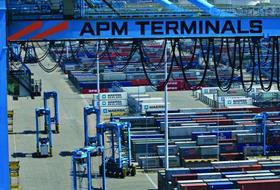
Maersk subsidiary APM Terminals has formally begun the expansion of the Port of Lázaro Cárdenas on Mexico’s Pacific Coast as part of its plan to develop a 4.1m TEU capacity deepwater facility.
The company will invest over US$900m in the Lázaro Cárdenas Terminal 2 (TEC2), with phase one of the three-phase project scheduled to open in 2015 with 1.2m TEU-worth of capacity, according to a press release from APM Terminals.
On Friday 9 November, the foundation stone for the expansion project was laid by the Mexican Federal Secretary of Communications and Transportation, Dionisio Perez-Jacome Friscione, the Governor of the Mexican State of Michoacan de Ocampo, Fausto Vallejo, and senior representatives of APM Terminals.
The Port of Lázaro Cárdenas is currently Mexico’s second busiest container port, according to APM.
¨We are very proud to be a part of Mexico’s growth, and look forward to creating a new world-class port facility which will reduce logistics costs and improve Mexico’s global competitiveness,” said APM Terminals vice-president for business implementation, Tiemen Meester, who also participated in the ceremony on 9 November.
Once completed, TEC2 will provide shipping companies with 1,485m of berth, 16 ship-to-shore (STS) cranes capable of handling Ultra Large Container Ships of 15,000 TEU capacity and above, and an annual throughput capacity of 4.1m TEUs.
APM said the new terminal’s design reflects the group’s focus on safety and sustainability, operating under the most stringent occupational safety standards.
The container handling equipment which will be used in TEC2 will also be eco-friendly, and feature the latest technology to maximise efficiency by conserving energy, and reduce harmful emissions, according to APM.
“The new terminal at Lázaro Cárdenas will create tremendous opportunities for the growth of international trade and new jobs for Michoacan de Ocampo and for all of Mexico,” stated APM Terminals Lazaro Cardenas general director Jorgen D. Nielsen.
APM Terminals operates a global terminal network comprising interests in 70 port facilities in 40 countries and inland services operations in 160 locations in 48 countries.



